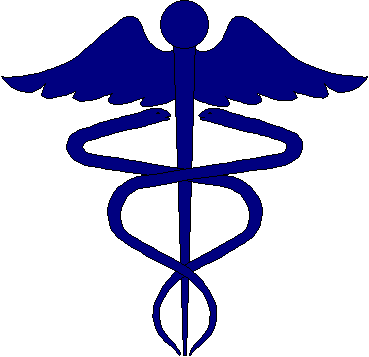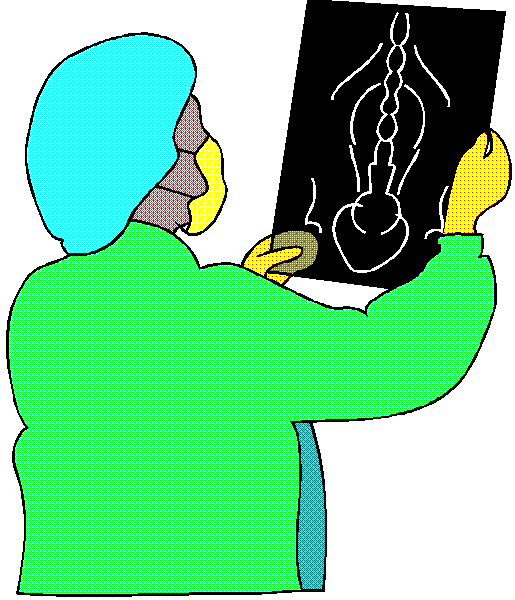 |
Assumption HS Class of 1977 |
 |
Assumption HS Class of 1977 |

LIFE, ADVICE AND
ANECDOTES, Marisa Medina, MD
Dr. Marisa Medina graduated from Assumption High School in 1977. She then moved back to her native Negros and began studies at Siliman University, with a major in pre-med. She continued med-proper at UE Manila. Upon graduation, Marisa spent a few years of residency in New York. She also lived in Orange, N.J., for a good many years. Afterward, Marisa moved to Las Vegas, Nevada, where she currently works as a successful practicing physician specializing in internal medicine. Her dry wit and wry sense of humor have never left her after all these years.
![]()
 GROWTH HORMONES
GROWTH HORMONES
![]() just read my big textbook and confirm that growth
hormone doesn't decline with age. There are some abnormal
conditions that could lower it, but aging doesn't seem to be one
of them. By the way it was just brought to my attention that
there are holistic type drugs being sold over the counter here in
the states that are said to be totally natural energy boosters,
and can also help you loose weight. They are said to be natural
hormone replacements. The one I encountered was thyroid hormone
and adrenal hormone replacements, they were brought in by a
patient who decided to take them because she was told they were
better because they were "natural" unlike the
prescribed pharmacy drugs. That patient came in with a very rapid
irregular heart beat and in heart failure. Her thyroid levels
were way too high, even though she took them according to the
instructions. I can go into more detail, but bottom line is --as
with any medication-- don't take those products if you don't know
or understand what is in them as they may even cause harm. By the
way, here's a little factoid: hormones come from animals, not
plants.
just read my big textbook and confirm that growth
hormone doesn't decline with age. There are some abnormal
conditions that could lower it, but aging doesn't seem to be one
of them. By the way it was just brought to my attention that
there are holistic type drugs being sold over the counter here in
the states that are said to be totally natural energy boosters,
and can also help you loose weight. They are said to be natural
hormone replacements. The one I encountered was thyroid hormone
and adrenal hormone replacements, they were brought in by a
patient who decided to take them because she was told they were
better because they were "natural" unlike the
prescribed pharmacy drugs. That patient came in with a very rapid
irregular heart beat and in heart failure. Her thyroid levels
were way too high, even though she took them according to the
instructions. I can go into more detail, but bottom line is --as
with any medication-- don't take those products if you don't know
or understand what is in them as they may even cause harm. By the
way, here's a little factoid: hormones come from animals, not
plants.
February, 2000
![]()
 MYTHS OF WATER
THERAPY
MYTHS OF WATER
THERAPY
![]() uch to my surprise, a lot
of people e-mailed me requesting more details as to why I felt
that the claims of Water Therapy are erroneous. The thinking
behind Water Therapy is that by drinking the specified amount of
water, the colon is cleansed and food can be more readily
absorbed and is turned into fresh new blood in the colon. This
fresh new blood would then cure acidity, constipation, diabetes,
hypertension, cancer and tuberculosis.
uch to my surprise, a lot
of people e-mailed me requesting more details as to why I felt
that the claims of Water Therapy are erroneous. The thinking
behind Water Therapy is that by drinking the specified amount of
water, the colon is cleansed and food can be more readily
absorbed and is turned into fresh new blood in the colon. This
fresh new blood would then cure acidity, constipation, diabetes,
hypertension, cancer and tuberculosis.
In the next paragraphs I provide an ultra simplified lecture in medicine to dispute the claims of Water Therapy.
First of all, hematopoeisis or the formation of blood does not occur in the colon. It occurs in the bone marrow. So the "undisputed" theory that the Water Therapy mentions can really be very easily disputed right there.
Water is indeed essential to life, and the bulk of our bodies and cells is composed of water. The body absorbs as much water as we take in and gets rid of all the excess water by urination. And so long as the body is normal it tells you that you need fluid when you feel thisty. The kidneys play a major role in this, and so long as the kidneys and the rest of the body is functioning normally, the body makes sure it keeps only what it needs. When some of our organs do not funtion properly, one of the problems is that the body keeps in more fluid than it can handle, and swelling occurs; or if the heart is malfuntioning, the excessive accumulation of fluid is called "congestive heart failure." Too much water intake, therefore, in these conditions can be fatal in fact.
One of the mainstays in the treatment of "high blood pressure" is called a diuretic, a medicine that causes a person to urinate a lot so as to get rid of a lot of fluid. It is medically wrong, however, to conclude that drinking all that water back will cure high blood pressure.
Drinking a good amount of water can make you feel full, therefore people have a tendency to eat less and that does help in people with Diabetes, but it doesn't cure it. The problem in diabetes is that there is a lack of insulin. However, there is no way that keeping well hydrated will replace the insulin levels.
Tuberculosis is caused by a bacteria that you catch from other people. It needs to be treated with antibiotics that can kill or control the bacteria. People with this illness tend to be weak, don't eat well and can get dehydrated easily. Therefore, drinking a lot of water is important to avoid dehydration. However, it is misleading to tell people that it will cure them of tuberculosis.
Cancer is a growth of abnormal cells. There is a variety of possible causes, but no one really knows for sure what causes normal cells to mutate. Again, these people tend to get dehydrated from the treatment or from lack of appetite. However, for Water Therapy to advocate that illnesses can be cured if one adopts the simple and free therapy, it is not only misleading but also cruel. Good hydration helps prevent dehydration, but is not curative.
Finally, there is a psychiatric illness called psychogenic polydipsia. People with this type of illness have an extemely strong impulse to drink a lot of water. They often take 8-10 liters of liquid a day. I guess by the principles of Water Therapy, they should be cured of all illlnesses. Unfortunately, it isn't so.
There are also side effects of too much water. The excess water overwhelms the kidney, the blood becomes too diluted that all the electrolytes go out of control, and a person may have a seizure. I have treated about two people with this -- one had high blood pressure, the other was a diabetic. In summary, it is right to keep well hydrated, but it may not be sufficient and can be downright dangerous to simply drink more water to "cure" the illness.
October, 1999
![]()
 GET UP AND GO!
GET UP AND GO!
![]() henever a patient presents
with chest pain, it is my job to find out where the pain is
coming from, and to determine if it is or isn't life threatening.
In determining if the pain is from the heart, we routinely ask
for cardiac risk factors present in the patients life that may
increase the likelihood the pain being cardiac. They are smoking,
diabetes, hyperlipidimia (elevated cholesterols, triglycerides)
obesity, family history of early (age 55 and below) of cardiac
disease, male sex (men have a higher risks than premenopausal
women), and sedentary lifestyle, with physical inactivity. Some
of these risk factors can be removed or controlled in order to
prevent early heart disease.
henever a patient presents
with chest pain, it is my job to find out where the pain is
coming from, and to determine if it is or isn't life threatening.
In determining if the pain is from the heart, we routinely ask
for cardiac risk factors present in the patients life that may
increase the likelihood the pain being cardiac. They are smoking,
diabetes, hyperlipidimia (elevated cholesterols, triglycerides)
obesity, family history of early (age 55 and below) of cardiac
disease, male sex (men have a higher risks than premenopausal
women), and sedentary lifestyle, with physical inactivity. Some
of these risk factors can be removed or controlled in order to
prevent early heart disease.
The Centers for Disease control and Prevention recommend that every adult should have at least 20-30 minutes of vigourous continous aerobic exercise three to five times a week. So, get up and go!
September, 1998
![]()
 "FACIAL"
REFLECTIONS ON MY BIRTHDAY
"FACIAL"
REFLECTIONS ON MY BIRTHDAY
![]() hank you very much for the
birthday greeting. Despite my advancing age I still get a kick
out of a birthday. My roommate treated me to a facial. Didn't
realize that it would hurt so much. The lady was Polish and I had
a funny suspicion that she was a German guard in the
concentration camps of World War II. She pricked my pimples with
a vengeance. I was squirming around in pain nearly in tears.
After an hour of that she whipped out the Ozone treatment, which
is a fancy name for a light bulb on a metal stick with tiny
electric shocks emanating from the bulb. She touched my skin with
this contraption multiple times. I could feel the electric shock
penetrating my skin. I couldn't escape, as she had her arm around
my neck. What an experience. Don't ever go to a Polish lady for a
facial.
hank you very much for the
birthday greeting. Despite my advancing age I still get a kick
out of a birthday. My roommate treated me to a facial. Didn't
realize that it would hurt so much. The lady was Polish and I had
a funny suspicion that she was a German guard in the
concentration camps of World War II. She pricked my pimples with
a vengeance. I was squirming around in pain nearly in tears.
After an hour of that she whipped out the Ozone treatment, which
is a fancy name for a light bulb on a metal stick with tiny
electric shocks emanating from the bulb. She touched my skin with
this contraption multiple times. I could feel the electric shock
penetrating my skin. I couldn't escape, as she had her arm around
my neck. What an experience. Don't ever go to a Polish lady for a
facial.
Assumpta Newsletter, Volume 1, Issue 4, October 1987.
![]()
 ON MAMMOGRAMS
ON MAMMOGRAMS
![]() ince the topic of the day
involves mammograms, I will put in my 2 cents. Mammograms are
definitely recommended every year for those age 50 and above. The
advent of the mammogram has without a doubt decreased the
mortality from breast cancer in that age group. However, it is a
"tossup" in the age group 40-49, nicely stated in a
recent editorial of the New England Journal of Medicine. Despite
the multiple studies done over the years however, no one was able
to prove that screening was effective. The American Cancer
Society does recommend a mammogram yearly to once every 2 years
beginning at the age of 40. Occasionally, the first mammogram may
be done at age 35 if the following factors exist:
ince the topic of the day
involves mammograms, I will put in my 2 cents. Mammograms are
definitely recommended every year for those age 50 and above. The
advent of the mammogram has without a doubt decreased the
mortality from breast cancer in that age group. However, it is a
"tossup" in the age group 40-49, nicely stated in a
recent editorial of the New England Journal of Medicine. Despite
the multiple studies done over the years however, no one was able
to prove that screening was effective. The American Cancer
Society does recommend a mammogram yearly to once every 2 years
beginning at the age of 40. Occasionally, the first mammogram may
be done at age 35 if the following factors exist:
(1) History of breast cancer in mother, sister, first degree relatives; (2) Nulliparous women (meaning those never pregnant like me and Marilou Abad); (3) Women whose first full term pregnancy occurred after the age of 35; (4) Early menarche (first menstruation) under age 12; (5) Known fibocystic disease of the breast; and (6) History of endometrial cancer. Hope this helps!
Assumpta Newsletter, Volume 1, Issue 4, October 1987.
![]()